
007: Nightfire
Written by: Rik
Date posted: October 18, 2014
- Genre: Action
- Developed by: Gearbox
- Published by: Electronic Arts
- Year released: 2002
- Our score: 5
The Brosnan Bond movies now comfortably fall into the category of things that seemed refreshing and modern at the time but have since dated somewhat. That’s not to say they don’t retain any charm or enjoyment, of course (if you turn on ITV2 now, there’ll probably be one on, so you can check), but there’s a certain 90s naffness that persists throughout. As for Pierce himself, he’s ok in the first couple of films – GoldenEye in particular – but in the later ones, his attire and demeanour – all cream suits, brown shoes and embarrassing chat up lines – are worryingly prescient of his ‘singing Dad’ turn in Mamma Mia. Barnd, Jaimes Barnd.
However, he was a clearly a big draw at the time – the films did well, after all – and after releasing a Bond game with a tuxedo-wearing silhouette on the front cover (2001’s Agent Under Fire) EA decided it was worth recruiting the current Bond actor to be ‘in the game’ for Nightfire. He isn’t really in it, though: his likeness is, but voice duties are performed by someone else (for more on which, see Oh Rexy, You’re So Sexy).
In general, Bond games seem to be largely a case of potential unrealised; lots of people are fond of Rare’s GoldenEye game on the N64, but subsequent attempts to recapture its appeal have always seemed to fall short. And that’s all on console, of course: Bond has rarely made an appearance on PC, with nothing since the Dalton tie-ins, unless you count James Bond: The Stealth Affair (which I don’t, because it wasn’t ever really a Bond game, it was a French adventure called Operation Stealth that was sneakily re-branded).
Nightfire begins promisingly, in the manner of one of the films, with the MGM credits and a title sequence with an original theme song and the customary swirling montage of women dancing and guns firing. But after that, when it comes to whether it really captures the Bond ‘feel’, it’s rather more hit and miss. What it unquestionably does right are the moments when you burst into a room full of bad guys and take them out while the Bond theme flourishes in the background. And, while some (including myself at various points during the course of playing the game) might question whether some of the traditional FPS staple of gunning down waves of bad guys is entirely appropriate for a 007 game, to be fair, shooting faceless henchmen and getting involved in fights with helicopters do usually form a significant part of the Bond movie experience.
But Nightfire is also a world of missed opportunities, with the licence almost criminally underused. For a start, the story is completely unmemorable, with a distinct lack of exposition, and some odd cuts and jumps in the story where you just feel like something is missing. (Having done a bit of research, the console version has some levels that just aren’t included here, which might account for the choppy nature of the storytelling). As is traditional, there is a big villain – Drake, an alleged environmentalist and humanitarian but actually an evil weapons smuggler who wants to fire a load of missiles at the earth from space – and as Bond, you have to stop him.
There’s a little more to it than that, but, as I mentioned, at various points I found it difficult to follow what was happening: it doesn’t help that the story is relayed via blurry video cut scenes, with low production values, rather than in-engine sequences. Bond himself says very little at first, to the extent that I thought the decision had been made to keep him mute as a rather cheap way of avoiding the fact that they couldn’t get Pierce to perform voiceover duties, but when he finally does, he’s far too smarmy and posh for my liking. ‘M’ and ‘Q’ are rarely seen: there are no real mission briefings, and certainly no explanation of 007’s famous gadgets and how they work (comparing unfavourably in this regard with No-One Lives Forever, which at least gave you a choice of which ones to take on a mission and the opportunity to test them before starting).
Even small touches that would have made a big difference are missing. For example, it would have been a nice touch to echo the films by including a brief, action packed prologue sequence prior to the opening theme and starting the game proper. (Apparently, this is actually present in the console Nightfire as the first of a number of driving missions, all of which have been excised from the PC version).
What we’re left with, then, is a fairly standard FPS with one or two concessions to the Bond licence, such as the aforementioned gadgets, most of which are fairly unexciting, save for the vaguely satisfying feeling of lasering a padlock with your watch. Most of the time a symbol tells you what to use and where, so they may as well just be keys, with the exception of the semi-useful ‘Q-Specs’ (for more on which, see No Pants Required) and the godforsaken grappling hook, which is almost impossible to work out when to deploy effectively (you’re meant to look out for hooks on the ceiling). There’s also a limit on the number of weapons you can carry (4) – which I suppose is slightly more realistic than having the usual arsenal of guns and projectile launchers at your fingertips, although it’s still hard to imagine Bond carting around a sniper rifle, a machine gun and a rocket launcher in addition to the trusty Walther PPK (which, I’m pleased to mention, remains an effective option throughout the game and hasn’t simply been relegated to the role of peashooter).
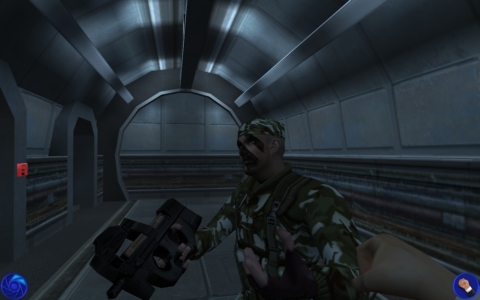
Judo chop! Nightfire’s punching is as effective as in most FPS games (ie something’s gone badly wrong and you’re just flailing desperately until you have to reload).
Despite some initial misgivings, I do actually think that an FPS is a perfectly appropriate genre for Bond, and I certainly don’t mind an action-packed approach, either (I wouldn’t ever lobby for more stealth, which is present here, albeit in a rather hamfisted form that you can sort of muddle your way through). But guile and subtlety are almost completely lacking in Nightfire. I suppose I wish that there was something a little more clinical, maybe even choreographed, that would allow you to infer some expertise on the part of your character in going about his work as a trained spy and killer – something like Max Payne’s bullet time that gives you an edge over your enemies other than simply being able to absorb their attacks more easily than they can yours. One of Nightfire’s advertised features is the so-called ‘Bond Moves’ – optional and often hidden tasks in each level supposedly there to allow you to prove how ‘Bond’ you are – but they can be as mundane as simply throwing a switch. It would have been good to see this used to reward your general effectiveness somehow rather than your ability to hunt for Easter Eggs.
As a pure shooter, it’s ok-ish. Admittedly, I’m a bit out of touch with the genre, but there are some fairly basic issues, such as the stupid AI enemies, who often stand around waiting to be triggered by your presence without responding to nearby colleagues being gunned down. When they do eventually wake up, they seem to have difficulty finding you – either running away, or around in circles – and sometimes they prefer to shoot at the walls, or their colleagues, instead of at 007. Incidentally, this was on the higher of two difficulty levels (a third can be unlocked), which meant that although the enemies weren’t very clever, they were rather adept at absorbing bullets, and more – at various points one of Drake’s men would take a rocket to the face before emerging from the smoke hopping on one leg as if all he’d done was stepped on a dog poo. And if a rocket launcher is no good when used on fleshy humans, it’s going to be even less effective against vehicles, and sure enough, helicopters and vans take several hits to bring down.
Speaking of helicopters, this particular face-off is reused a few times to the point where it feels a bit tired, and even the final boss fight is a rehash of a previous one (laser shoot out in space suits). Repetition of locations and assets is noticeable at various points, too, even though there are only 9 levels. Bugs and glitches are abundant: the corpses of enemies zoom into the air and out of the room, you can get stuck on the scenery, switches get thrown but provide no indication that anything has changed (sometimes a lever may make a noise but doesn’t move) and at one point I fell out of a cable car with distinctly non-fatal consequences. You can also trigger a cut-scene on low health, thinking you’ve *just* made it, only to realise that the sequence started while you were starting to die and by the time you resume control, that process is complete. Finally, mid-level transitions frequently dump you immediately into confrontation as soon as the screen fades in, which seems like a cheap strategy if deliberate, or bad design if not.
This general feeling of sloppiness, allied to the unused potential of the licence (and a few sneaky looks at the console versions on YouTube) give the impression that some corners have been cut here, which is disappointing when you consider the resources at EA’s disposal. Nightfire‘s production values seem more on a par with something like Die Hard: Nakatomi Plaza, but without the latter’s low-budget charm or evident enthusiasm for the source material. Overall, then, 007: Nightfire isn’t awful, but it’s rather scrappy, rushed and unmemorable. Which is a shame.

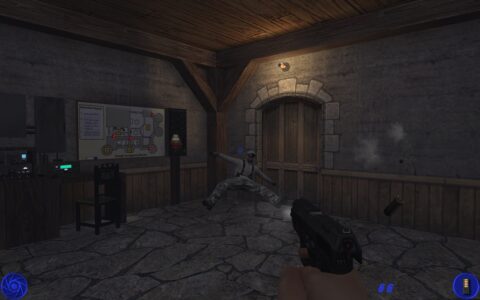
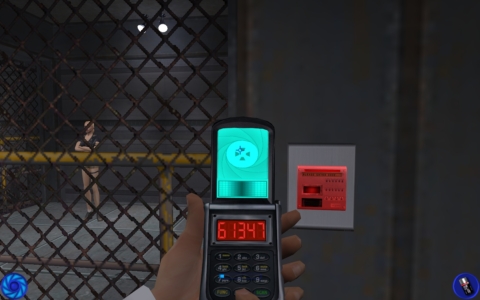
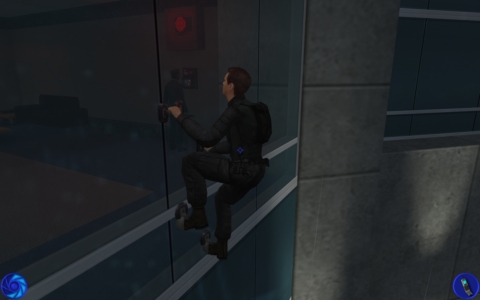
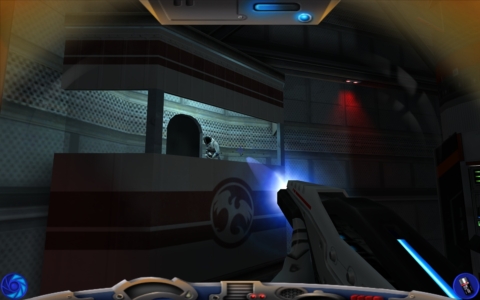

 Posts
Posts